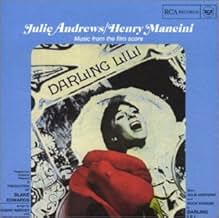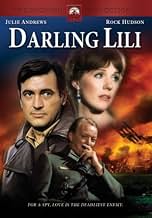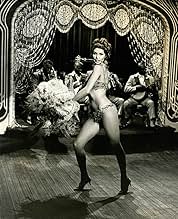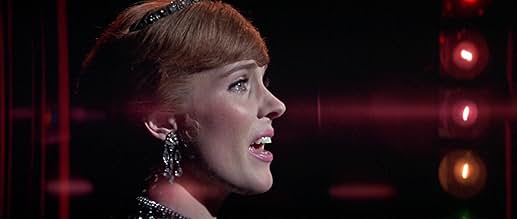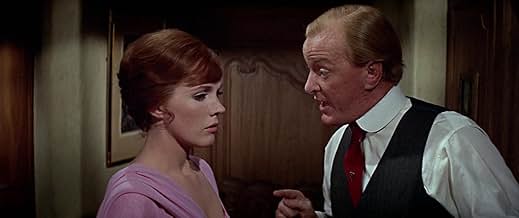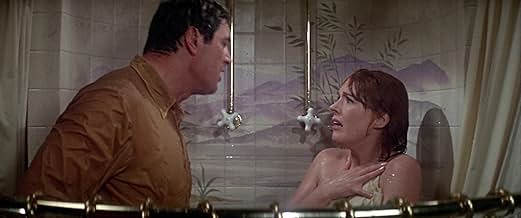VALUTAZIONE IMDb
6,0/10
2573
LA TUA VALUTAZIONE
Aggiungi una trama nella tua linguaSet during World War I, this movie is a cute spin on the Mata Hari legend.Set during World War I, this movie is a cute spin on the Mata Hari legend.Set during World War I, this movie is a cute spin on the Mata Hari legend.
- Regia
- Sceneggiatura
- Star
- Candidato a 3 Oscar
- 1 vittoria e 7 candidature totali
Arthur Gould-Porter
- Sergeant Wells
- (as A.E. Gould-Porter)
David Armstrong
- Squadron Pilot
- (non citato nei titoli originali)
Yves Barsacq
- French General
- (non citato nei titoli originali)
Recensioni in evidenza
Darling Lili may have been a major flop at the time, but to me it is not a bad film. Not great, uneven is a good way to describe it, but it is much better than its reputation. It is overlong, the comedy/slapstick scenes at times feel out of place and compared to the other themes that make up the film at odds with the rest of the film, the film can get muddled, the film can drag and Rock Hudson while likable is rather stiff- compared to his usual performances- and doesn't have the strongest of chemistrys with Julie Andrews(though not without its moments). Julie Andrews though is great though, her acting and presence are charming and she as ever sings like an angel. Lance Percival shines also in possibly his best film role and one of his best performances. The film looks gorgeous, the highlights being the marvellously shot aerial dogfight sequences and the visuals that accompany the song Whistling Away the Dark. The music is distinctive Henry Mancini, it fits the film adeptly and is a very memorable score and one you can re-visit more than once. Much has been said about the hauntingly beautiful Whistling Away the Dark, how Andrews sings it(like an angel and with so much nuance and emotion) and how it's staged and for good reason, simply put it's a beautiful song that is beautifully sung and beautifully staged. The script and the story aren't great but they're not disastrous either. The script is intelligent with some snappy moments, it didn't feel that talky, and the story at least has some entertainment value despite moments being muddled and the spy thriller, drama and musical themes being far more convincing than the comedy and romance ones. Overall, uneven but Darling Lili a decent film and is much better than it's made out to be, though it's somewhat easy to see why it was a flop. 6/10 Bethany Cox
I remember seeing DARLING LILI when it ran it's short original theatrical release. I also remember being the only person in the theatre during the particular showing I attended. It saddens me now as it did then that this beautifully crafted and delightful film was so sneered at and snubbed by critics and audiences alike. Movie musicals made a brief comeback in the early sixties and peaked with THE SOUND OF MUSIC in 1965. Hollywood continued to make them and even though two of them, OLIVER! and FUNNY GIRL, were mildly successful, the genre was again on the decline. The movie musicals of the late 60s all died at the box office including DOCTOR DOLITTLE, CAMELOT, FINIAN'S RAINBOW, GOODBYE MR. CHIPS, CHITTY CHITTY BANG BANG, PAINT YOUR WAGON, HALF A SIXPENCE, SWEET CHARITY, HELLO DOLLY! as well as Andrews' other underrated drama with music, STAR! which I consider a companion piece to both DARLING LILI and Andrews' comeback film, VICTOR,VICTORIA. But even in 1970 the movie musical struggled to survive with not only DARLING LILI but two other large scale musical extravaganzas, ie: ON A CLEAR DAY YOU CAN SEE FOREVER and SCROOGE. Much salt was added to the wound when not only 'LILI' but also 'CLEAR DAY' and SCROOGE tanked at the box office. These films failed not because they were bad films but because audiences had grown cynical and no film was any good unless it was "realistic". It seemed that going to the movies was no longer an excercise in temporarily putting one's troubles aside for a few hours of nurturing the spirit and soul with beautiful singing and dancing. Critics and audiences seemed to have taken themselves so seriously that even their entertainment had to be a reflection of their harsh day to day realities. One was labeled old fashioned and unhip to enjoy movie musicals. As for DARLING LILI, I found this delightful comedy farce with music to be truly charming and funny. Julie Andrews is in top form both musically and dramatically. Not only that but her comic talents are equally displayed. She looks gorgeous in this film and like STAR! she dazzles us in her canny ability to retain her girl next door demeanor and be damn sexy at the same time. Of course her success in keeping the balance of wholesomeness and sexy seductiveness is in part due to the excellent directing of her director/husband Blake Edwards. Again, the movie's failure at the box office is due the audiences' inability to appreciate what Edwards was trying to do. They just plain didn't get it. Nor did the critics have a clue either. Edward's clever variation on the Mata Hari story mixing musical numbers and intrigue and farce and romance with World War 1 the backdrop should have been embraced by the public during the Vietnam years as a bit of reprieve and relief from all the turmoil of the times; not as a way to forget the harsh realities but to make them easier to cope with. But this was not to be. I sometimes wonder if this movie would be better received if it was being released now for the first time.
Besides the highly entertaining adventure comedy, the music is gorgeous. Ms. Andrews sings one of the finest songs of the period, the haunting "Whistling Away the Dark" which was tragically robbed of the Best Song Oscar for 1970. But all the songs are great written by Henry Mancini. The sumptuous sets, art direction and costumes frame the movie with grand artistic opulence. Rock Hudson is great as an American fighter pilot and he revives his suave, debonair dash reminiscent of his farcical bedroom comedies with Doris Day.
For several years now I have longed for Mr. Edwards to release a widescreen letterbox video release on DVD. To my knowledge there has never been home video version. I'm willing to bet that the DVD would do well in sales. Edwards could even do a Julie Andrews commemorative box set of DARLING LILI and VICTOR VICTORIA in gorgeous letterboxed DVD transfers with all the fancy extra features. Well, one can dream. If I knew how to contact Mr. Edwards and Ms. Andrews I'd write them a letter begging them to make DARLING LILI available. Heck, I'd grovel if necessary. I'd love to tell everyone to go out and rent this wonderful movie but I can't since it's not available. The only way one can see this film is when it's broadcast on cable - which I don't have. And even then it's not always shown in it's widescreen splendor. Often one is subjected to cable broadcasts of the film in the horrific pan and scan format which sadly upstages and obstructs the artistic integrity of the film. If I were Julie Andrews or Blake Edwards, I would want to share this lovely work of art on film in the very best venue possible: DVD home video in widescreen. So far, all we are allowed is an occasional glimpse of this little gem often crippled by pan and scan butchery via cable, a source slowly dying off with the emergence of Direct TV and the growing popularity of DVDs and DVD players.
Besides the highly entertaining adventure comedy, the music is gorgeous. Ms. Andrews sings one of the finest songs of the period, the haunting "Whistling Away the Dark" which was tragically robbed of the Best Song Oscar for 1970. But all the songs are great written by Henry Mancini. The sumptuous sets, art direction and costumes frame the movie with grand artistic opulence. Rock Hudson is great as an American fighter pilot and he revives his suave, debonair dash reminiscent of his farcical bedroom comedies with Doris Day.
For several years now I have longed for Mr. Edwards to release a widescreen letterbox video release on DVD. To my knowledge there has never been home video version. I'm willing to bet that the DVD would do well in sales. Edwards could even do a Julie Andrews commemorative box set of DARLING LILI and VICTOR VICTORIA in gorgeous letterboxed DVD transfers with all the fancy extra features. Well, one can dream. If I knew how to contact Mr. Edwards and Ms. Andrews I'd write them a letter begging them to make DARLING LILI available. Heck, I'd grovel if necessary. I'd love to tell everyone to go out and rent this wonderful movie but I can't since it's not available. The only way one can see this film is when it's broadcast on cable - which I don't have. And even then it's not always shown in it's widescreen splendor. Often one is subjected to cable broadcasts of the film in the horrific pan and scan format which sadly upstages and obstructs the artistic integrity of the film. If I were Julie Andrews or Blake Edwards, I would want to share this lovely work of art on film in the very best venue possible: DVD home video in widescreen. So far, all we are allowed is an occasional glimpse of this little gem often crippled by pan and scan butchery via cable, a source slowly dying off with the emergence of Direct TV and the growing popularity of DVDs and DVD players.
Julie and Blake deliver a real bomb {no pun intended}of a World War 1 musical with this sloppily made mega budget mess. Julie's voice is always a joy, but the music here is of the "in one ear, out the other" variety. Hudson shows all the romantic magnetism of a buttered scone and his scenes with Julie hold about as much spark as my 1987 Yugo. The comic relief is painfully unfunny, the flying scenes ho hum {with most of the aircraft and even one of the stars, Jeremy Kemp, rehashed from "The Blue Max"}and the whole experience just makes me glad that I saw this on free TV. Its a long way to Tipperary alright, this movie is closer to Verdun....
I suppose I like this film as well as any I know; it is not perfect, but under the title "The Americanization of Lily" this charming and memorable semi-musical satire might I suggest have been appreciated more, and still loved by those who recognized its special Blake Edwards'-produced spirit of gentleness, clever humor and solid narrative. The improbably but delightful story-line follows Lili Smith, a fringe-type spy for the Germans in a much simpler and less black-and-white war; Lili Schmidt passing as Smith is helping her Uncle who is patriotic too, for Germany but neither cruel nor political, merely opportunistic. Lili's target is William Larrabee, a charismatic U.S. squadron leader who can supply her valuable information. The plot thickens comes when Lili falls in love with Larrabee, has her eyes opened to the consequences of her playing spy, and sees the effects of combat on wounded men at a hospital and realizes what it might mean to his men whom she has met and likes. She gets jealous of a rival for Larrabee's affections, then realizes she can no longer do what she has been doing and gives up the spy business. The logical end of the film comes when after the terrible WWI has ended, as she sings the theme song of the film, "Wishing" in a darkened theater, one by one the members of Larrabee's squadron appear, including her lover himself, indicating they have forgiven her and their former opponents; and even Uncle Kurt enthusiastically joins in the singing of "It's a Long To Tipperraree", to indicate all is well with the world again. This is an audacious and sometime brilliant story idea, written by director Blake Edwards and William Peter Blatty of "John Goldfarb" fame; and it is a delightful narrative. Larrabee's squadron, including an inebriate who keeps crashing and other lovable types populate this lively film; and the feel of this stylish and glowing film is almost epic, both in its scope and realization. Credit must go to Jack Bear and Donald Brooks for their costume creations, Reg Allen and Jack Stevens for sets, Fernando Carrere for another beautiful production design, Henry Mancini for his sensitive and appropriate musical score, and to Russell Harlan for his shining cinematography. In the beautiful footage, the principal actors are Julie Andrews as Lili, Rock Hudson as Larrabee, Keremy Kemp outstanding as Lili's Uncle Kurt, Michael Witney, Lance Percival as the inebriate pilot, gorgeous Gloria Paul as Lili's stripteasing rival, and many other fine actors in smaller parts. It is hard to say enough nice things about the pace, or the cleverness of the just-this-side-of broad comedy; this element is introduced by Edwards to leaven the horrors of actual warfare, to example the almost comic-opera approach with which men made war back in a more innocent-minded era of human civilization.. This comedy also helps prepare the way for Lili's conversion from uncritical acceptance of a duty to the German state to acceptance of the reality of what she is doing and potentially what she may be causing. This is a rare "sense-of-life" film about Lili's "Americanization", her assertion of herself in the real world and then among others before tragedy can happen. It is haunting, I find, and beautiful in many ways. I consider it to be Blake Edwards'masterpiece of directing; and under the title "The Americanization of Lili" I believe with hardly any changes it might have been recognized as the polished sapphire of a film it is by every standard I know.
After 35 years, I've seen this film again; the 136 minute version at the Anthology Film Archives in New York City's East Village. They also showed the 114 minute version which, according to their production notes, is darker in tone, since it's missing some of the comedy of the piece. Certainly some of the cutesy comedy, which Blake Edwards, the director/producer/writer, also seems to be enamored of in his Pink Panther movies, could be cut.
The film is an attempt to make a mature, romantic musical and was a big flop at the time. Edwards was married to Julie Andrews, the female star of the movie. Andrews had a great success with "Mary Poppins" a few years earlier, and a phenomenal success with "The Sound of Music." She tried repeating the success with the awful (but, perhaps, commercially successful) "Thoroughly Modern Millie," and had a stinker with "Star!", the Gertrude Lawrence story. "Star!" was an adult musical, but it didn't take, so "Darling Lili" was another try at breaking Andrews' goody-two-shoes image. She says "ass" in the movie twice and "bastard" once! The scenes I remember most from the first screening in 1970 are the striptease by Suzette (Gloria Paul) and the aerial sequences, which are pretty dazzling (except for the obvious process shots). In fact, the whole movie is quite lavish and Andrews is gowned and bejeweled beautifully. Edwards seems to have studied the films of Vincente Minnelli and is better at creating some of the Minnellian tone than George Cukor was with the dull "My Fair Lady." In fact, Minnelli was making a movie - "On A Clear Day..." - at Paramount the same time "Darling Lili" was being produced. "...Lili" went into major cost overruns, which could account for "...Clear Day..." being so lackluster in its modern scenes, since major money was being pumped into the Andrews/Edwards film.
The movie isn't terrible. In fact, it's quite charming, if a little long. But the movie-going public is fickle, and Julie Andrews musicals fell quickly out of favor. Rock Hudson is enormously likable as always, but has little to do. The production design is delightful, and it's fun to see Andrews do her striptease (which may not be in the shorter version, and I'm thinking that must have been the version I saw in 1970, because I think I would have remembered it).
Maybe the movie will come out on DVD now that they are showing two versions in NYC. The print was beautiful, by the way. It even included the overture. The audience was a poignant collection of solitary film nerds, not excluding myself!
The film is an attempt to make a mature, romantic musical and was a big flop at the time. Edwards was married to Julie Andrews, the female star of the movie. Andrews had a great success with "Mary Poppins" a few years earlier, and a phenomenal success with "The Sound of Music." She tried repeating the success with the awful (but, perhaps, commercially successful) "Thoroughly Modern Millie," and had a stinker with "Star!", the Gertrude Lawrence story. "Star!" was an adult musical, but it didn't take, so "Darling Lili" was another try at breaking Andrews' goody-two-shoes image. She says "ass" in the movie twice and "bastard" once! The scenes I remember most from the first screening in 1970 are the striptease by Suzette (Gloria Paul) and the aerial sequences, which are pretty dazzling (except for the obvious process shots). In fact, the whole movie is quite lavish and Andrews is gowned and bejeweled beautifully. Edwards seems to have studied the films of Vincente Minnelli and is better at creating some of the Minnellian tone than George Cukor was with the dull "My Fair Lady." In fact, Minnelli was making a movie - "On A Clear Day..." - at Paramount the same time "Darling Lili" was being produced. "...Lili" went into major cost overruns, which could account for "...Clear Day..." being so lackluster in its modern scenes, since major money was being pumped into the Andrews/Edwards film.
The movie isn't terrible. In fact, it's quite charming, if a little long. But the movie-going public is fickle, and Julie Andrews musicals fell quickly out of favor. Rock Hudson is enormously likable as always, but has little to do. The production design is delightful, and it's fun to see Andrews do her striptease (which may not be in the shorter version, and I'm thinking that must have been the version I saw in 1970, because I think I would have remembered it).
Maybe the movie will come out on DVD now that they are showing two versions in NYC. The print was beautiful, by the way. It even included the overture. The audience was a poignant collection of solitary film nerds, not excluding myself!
Lo sapevi?
- QuizA very troubled production, this movie went way over budget and was a box-office flop when released. Director Blake Edwards used the experience of making this movie as the inspiration for the script to S.O.B. (1981).
- BlooperIn the "Cafe Can Can" scene the World War I American pilots are said to belong to an "Eagle Squadron" but that term was only used for Americans flying with the RAF in World War II.
- Citazioni
Lili Smith: But then, why *does* he drink?
Maj. William Larrabee: Because he's afraid to fly.
Lili Smith: Then why does he fly?
Maj. William Larrabee: Because he likes to drink!
- Curiosità sui creditiThe Paramount Pictures logo does not appear in the beginning of the film, only at the end of the film.
- Versioni alternativeTwo decades after its original release, director Blake Edwards re-cut the film for the TNT network, shortening it by 22 minutes and dramatically changing its tone. This so-called "director's cut" runs 114 minutes.
- ConnessioniFeatured in Entertainment This Week Salutes Paramount's 75th Anniversary (1987)
- Colonne sonoreLa Marseillaise
by Claude Joseph Rouget de Lisle
Special French Lyrics Translations by Danielle Mauroy and Michel Legrand
I più visti
Accedi per valutare e creare un elenco di titoli salvati per ottenere consigli personalizzati
- How long is Darling Lili?Powered by Alexa
Dettagli
Botteghino
- Budget
- 25.000.000 USD (previsto)
- Tempo di esecuzione2 ore 16 minuti
- Proporzioni
- 2.35 : 1
Contribuisci a questa pagina
Suggerisci una modifica o aggiungi i contenuti mancanti

Divario superiore
By what name was Operazione crepes suzette (1970) officially released in India in English?
Rispondi

